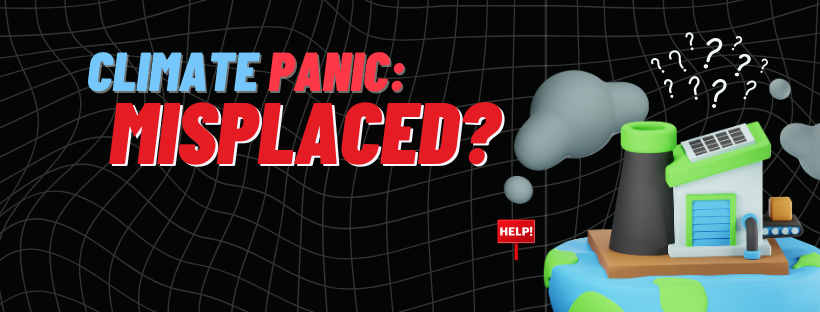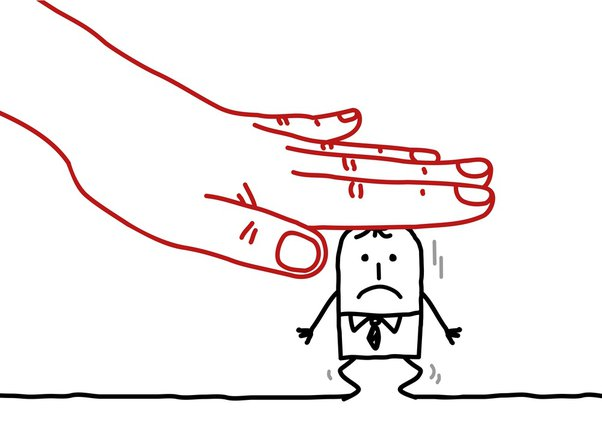
- Of course, I am in favour of sustainability– who is not?
- 'The people who most fanatically adhere to climate alarmism generally know little about it.'
- “The panic is misplaced and rigorously rebuilding society and the economy is not a good idea. Occasionally I will say that too.'
Google Translated from Dutch to English. Here is the link to the original article in Dutch. The article was originally published on 10 July 2023.
Last Saturday there was an interview with me in the FD written by Mathijs Rotteveel in the section 'dinner with the FD'. Although all kinds of different topics were discussed, I mainly received reactions to my visions about sustainability and climate that differed from the consensus.
In most cases, it was noted that I gave little or no substantiation for my differing opinions. That's right, but that's not really what the interview was about and space in such an article is limited. That is why I would like to give a more detailed explanation here. The following is about sustainability. In a few days, I also hope to write an explanation about the comments I made in the interview about climate.
Incidentally, I have to say that the interview resulted in very different reactions—lots of approval, but also lots of disapproval. What is striking is the explosion of negative emotions among the disapproving reactions on social media. You know that can happen, but you'll never get used to having buckets of sludge poured over you and being completely dragged through the mud. If you say something about a subject people don't like, you're also no good in other areas. One tweeter thought I was a very bad economist, but added “I'm not an economist, but I'm good at judging”. I appreciate that kind of self-reflection. Apparently, this person is walking around with a plethora of feelings of contempt and needs to vent them somewhere.
Of course, I am in favour of sustainability – who is not?
Let me start by saying that I am of course in favour of a just and sustainable world. I am sixty-six (66) and have four (4) children and three (3) grandchildren. Of course, I want to leave the world at least as beautiful as I found it when I was born. It will undoubtedly succeed on many fronts. My first 'home' was a two-room house without a bathroom where we lived with five people after the birth of my younger brother. Where do you still find that? By the way, we were very happy. Life expectancy is now considerably higher than in 1957. Poverty in the world has fallen very sharply. Many more children go to school and get the chance to make something of their lives. Many diseases have disappeared or have been greatly reduced. The material standard of living is much higher everywhere than in the year I was born. And although you might not immediately think so, the air quality in our country and the water quality in our rivers have improved greatly in recent decades. Unfortunately, there are still plenty of areas where things can be improved.
If you want to be sustainable, you must first determine what exactly that is. It annoys me immensely when people don't even seem to ask themselves that question. It is certainly not as if there is a clear, clear, and universally applicable dividing line between what is sustainable and what is not. And so hordes of people run after something when there is a permanent sticker on it.
How complicated it can be to assess what exactly is sustainable is illustrated by the discussions at the EU level about whether biomass, natural gas, and nuclear energy are sustainable.
It is not uncommon for subjective judgments to be made when assessing whether something is sustainable or not. You then see that some try to present their opinion as objective truth. That also irritates me.
Often it is even a moral judgment. I have no problem with that in itself. But something like that is very personal. If my loved ones address me on my moral compass, that's fine. Something like that fits the personal relationships we have. However, I get rather anxious when others want to impose their moral compass on me and measure me morally. Who does a bank or a pension fund think they are to impose a moral compass on me and to take the measure?
Democracy by sample
Pension funds often still conduct a survey among their members when designing their sustainability policy. Then it is democratically (well, democratically, it is usually a random sample) determined what should or should not be done with the investments. That doesn't seem unreasonable, but it is. I completed such a survey once. You really have to be a huge jerk if it doesn't come out that you are in favour of a solid sustainability policy.
I am a compulsory participant in a pension fund, it is my money. Why should a majority rule that my money should not be invested in companies that conduct activities that are completely legal? How the members of a pension fund should live is not determined by a majority vote (and then only among a random sample). Or is that our future perspective?
I may have missed it and maybe it will come. But if the board of my pension fund decides that my money may not be invested in certain companies, then I expect at least a report on what that has meant in terms of investment returns and what the world has gained.
Those who want to invest sustainably often base their policy on ratings drawn up by a third party. Then it seems objective, but it only shifts the problem to that third party. This is often based on rules, agreements, or objectives such as the UN Sustainable Development Goals (SDGs). Even then, in my opinion, there is a lot of room for personal interpretation. There are many investors who, based on sustainability on the basis of these SDGs, immediately want to say goodbye to fossil fuels and also to the production and use of artificial fertilisers. But the world cannot run in the short term without fossil fuels. And without fertiliser, a large part of the world's population would starve. Such a policy, therefore, seems to me to be in direct contradiction to the first and second SDGs: 'no poverty' and 'no hunger' respectively.
Weapons: a necessary evil
For example, there are countless inconsistencies between how sustainable investing is interpreted and how people actually live and what they expect from life. Many investors exclude interests in arms manufacturers, but they do expect our military to protect our freedom and participate in peacekeeping missions. Of all the companies on pension fund exclusion lists, the largest number owe that place to their involvement in nuclear weapons. I find that very strange. The Netherlands is a member of NATO and some other members have nuclear weapons. Of course, I am not in favour of using such weapons, but the fact is that our freedom is protected by them. Maybe it's just me, but I think it's hypocritical.
A company that is excluded by many Dutch investors because of its involvement in nuclear weapons is the American Raytheon. Nevertheless, we were very pleased with ourselves when we were able to make our Raytheon-produced Patriot and Stinger missiles available to Ukraine. Maybe it's just me, but I think it's hypocritical.
Companies that are also invariably on such lists because of their involvement in nuclear weapons are Boeing and Airbus. Still, I don't know anyone who doesn't get into a device from those companies if they have to travel far. Maybe it's just me, but I think it's hypocritical.
Cluster munitions, fracking, and alcohol
Unlike producers of nuclear weapons, it is prohibited by law to have interests in companies that produce cluster munitions. The ethical objection to cluster munitions is that not all explosives detonate when used. In an area where cluster munitions have been used, civilian casualties can still occur years later. That there is a dilemma here is evident from the fact that Ukraine has asked for such weapons. They want to deploy that ammunition on Ukrainian territory. It would help the Ukrainian military because they are numerically outnumbered. Apparently, that weighs more heavily on the leaders than the possible future victims among their own civilian population. I'm not saying that cluster munitions should be permissible, but it does outline an interesting ethical case.
A completely different example is fracking in the extraction of natural gas. We are against this in Europe and it is not applied in most European countries. Since the supply of Russian gas has been reduced and then virtually stopped, we buy as much LNG as possible. A lot of that LNG comes from the US and is extracted with 'fracking'. Nobody objects to that. Maybe it's just me, but I think that's hypocritical.
Another very different example. Recently I took part in the investment meeting of a foundation with an emphatic ethical stamp. Fine. The foundation does not want to 'invest in alcohol'. Also fine. The foundation invites external members of the investment committee for dinner once a year. The chairman and the employees then cheerfully drink a drink or a beer beforehand – the externals, including me, by the way – and then pride themselves on their virological expertise when choosing the wine. I think it's fine but look at it with some surprise.
More voting rights for young people?
The CEO of a cooperative company recently told me about a dilemma the company is facing. Talented young people only want to come and work for the company if there is a full commitment to sustainability. But for the members of the cooperative, the sustainability policy goes too far and too fast. Now I know that you can say that young people are the future. Some even propose giving young people more voting rights than older people. In other cultures, the elderly are valued precisely for the wisdom they have accumulated in their lives. In our country, the quality of education is deteriorating, but it is apparently thought that young people are the wisest.
I have been a member of investment committees in the pension sector for many years and have often participated in discussions about sustainability policy. The attitude of many board members has regularly surprised and disappointed me. Many are passive. They seem to support sustainability policy because they have to. The policy memorandums to be discussed are usually written by young 'sustainability experts' from the implementing organisation or the administrative office. I have rarely, if ever, heard board members ask critical questions. They found my objections and comments difficult.
The role of activists
I find the role of activists in sustainability problematic. Forgive me, I have nothing against activists. In fact, they are important because they raise issues. So you have to listen to what they have to say. But activists are by definition one-sided and they will rarely be satisfied. In order to make policy and organise society, interests must be weighed against each other. Activists, by definition, will never do that. That's why you should never let them call the shots and never base your policy solely on what activists want. In my opinion, however, that happens a lot. In the end, I think that will turn the tide because many people notice that their interests are subordinated to what the activists want. It may take a while, but in the end, it will not be accepted.
The role of the revenue model
Although there are bound to be companies and institutions whose owners and directors genuinely participate in the sustainability movement, there are also many that simply piggyback because they see a revenue model in it. Such an attitude irritates me immensely. If you point out inconsistencies to those people and ask critical questions, you will not get a substantive discussion in response, but rather a prickly but urgent request to shut up, because you are getting in the way of their revenue model.
Not only in the world
Sometimes I get the feeling that we in Europe, and especially in the Netherlands, think that we are a shining example for the rest of the world. We are morally superior and everyone will eventually follow us. Reality is different. In Asia, everyone is betting on economic growth and people are watching with increasing amazement how we impose all kinds of restrictions on ourselves in Europe.
An anti-ESG movement has emerged in the US. How powerful it will be and what it will achieve remains to be seen. But it makes one think that sales of Bud Light, the best-selling beer in the US, recently took a big tumble after Budweiser used a transgender influencer to promote the beer. That apparently went too far for the beer-drinking Americans. Budweiser immediately discontinued the promotion. “So much for principle…”
Just last week I took part in an investment meeting where representatives of a large Dutch bank explained their sustainability policy. They said European stocks would be over-represented in the portfolio and the US under-represented because it is so difficult to find US companies that meet the strict sustainability requirements. Does that say something about American companies or about sustainability requirements?



